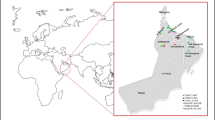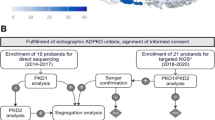Abstract
Background
ADPKD is one of the most common inherited disorders, with high risk for end-stage renal disease. Numerous patients, however, have no relatives in whom this disorder is known and are unsure whether they may transmit the disease to their offsprings. The aim of this study was to evaluate whether germline mutation analysis adds substantial information to clinical symptoms for diagnosis of ADPKD in these patients.
Methods
Clinical data included renal function and presence of liver or pancreas cysts, heart valve insufficiency, intracranial aneurysms, colonic diverticles, and abdominal hernias. Family history was evaluated regarding ADPKD. Germline mutation screening of the PKD1 and PKD2 genes was performed for intragenic mutations and for large deletions.
Results
A total of 324 adult patients with ADPKD including 30 patients without a family history of ADPKD (sporadic cases) were included. PKD1 mutations were found in 24/30 and PKD2 mutations in 6 patients. Liver cysts were present in 14 patients and intracranial aneurysms in 2 patients. Fourteen patients (45%) had no extrarenal involvement. Compared to the 294 patients with familial ADPKD, the clinical characteristics and the age at the start of dialysis were similar in those with sporadic ADPKD.
Conclusion
The clinical characteristics of patients with sporadic and familial ADPKD are similar, but sporadic ADPKD is often overlooked because of the absence of a family history. Molecular genetic screening for germline mutations in both PKD1 and PKD2 genes is essential for the definitive diagnosis of ADPKD.

Similar content being viewed by others
References
Gabow PA (1993) Autosomal dominant polycystic kidney disease. N Engl J Med 329(5):332–342. doi:10.1056/NEJM199307293290508
Torres VE, Harris PC, Pirson Y (2007) Autosomal dominant polycystic kidney disease. Lancet 369(9569):1287–1301. doi:10.1016/S0140-6736(07)60601-1
Wilson PD (2004) Polycystic kidney disease. N Engl J Med 350(2):151–164. doi:10.1056/NEJMra022161
Pirson Y (2010) Extrarenal manifestations of autosomal dominant polycystic kidney disease. Adv Chronic Kidney Dis 17(2):173–180. doi:10.1053/j.ackd.2010.01.003
Hateboer N, Lazarou LP, Williams AJ, Holmans P, Ravine D (1999) Familial phenotype differences in PKD11. Kidney Int 56(1):34–40. doi:10.1046/j.1523-1755.1999.00541.x
Chatha RK, Johnson AM, Rothberg PG, Townsend RR, Neumann HP, Gabow PA (2001) Von Hippel-Lindau disease masquerading as autosomal dominant polycystic kidney disease. Am J Kidney Dis 37(4):852–858
Neumann HP (1999) The spectrum of renal cysts in adulthood—discussion of eight cases. Nephrol Dial Transplant 14(9):2234–2244
Reeders ST, Breuning MH, Davies KE, Nicholls RD, Jarman AP, Higgs DR, Pearson PL, Weatherall DJ (1985) A highly polymorphic DNA marker linked to adult polycystic kidney disease on chromosome 16. Nature 317(6037):542–544
Mochizuki T, Wu G, Hayashi T, Xenophontos SL, Veldhuisen B, Saris JJ, Reynolds DM, Cai Y, Gabow PA, Pierides A, Kimberling WJ, Breuning MH, Deltas CC, Peters DJ, Somlo S (1996) PKD2, a gene for polycystic kidney disease that encodes an integral membrane protein. Science 272(5266):1339–1342
The European Polycystic Kidney Disease Consortium (1994) The polycystic kidney disease 1 gene encodes a 14 kb transcript and lies within a duplicated region on chromosome 16. Cell 78(4):725
The European Polycystic Kidney Disease Consortium (1994) The polycystic kidney disease 1 gene encodes a 14 kb transcript and lies within a duplicated region on chromosome 16. Cell 77(6):881–894
Rossetti S, Burton S, Strmecki L, Pond GR, San Millan JL, Zerres K, Barratt TM, Ozen S, Torres VE, Bergstralh EJ, Winearls CG, Harris PC (2002) The position of the polycystic kidney disease 1 (PKD1) gene mutation correlates with the severity of renal disease. J Am Soc Nephrol 13(5):1230–1237
Wu G, Hayashi T, Park JH, Dixit M, Reynolds DM, Li L, Maeda Y, Cai Y, Coca-Prados M, Somlo S (1998) Identification of PKD2L, a human PKD2-related gene: tissue-specific expression and mapping to chromosome 10q25. Genomics 54(3):564–568. doi:10.1006/geno.1998.5618
Rossetti S, Chauveau D, Kubly V, Slezak JM, Saggar-Malik AK, Pei Y, Ong AC, Stewart F, Watson ML, Bergstralh EJ, Winearls CG, Torres VE, Harris PC (2003) Association of mutation position in polycystic kidney disease 1 (PKD1) gene and development of a vascular phenotype. Lancet 361(9376):2196–2201. doi:10.1016/S0140-6736(03)13773-7
Grantham R (1974) Amino acid difference formula to help explain protein evolution. Science 185(4154):862–864
Ng PC, Henikoff S (2006) Predicting the effects of amino acid substitutions on protein function. Annu Rev Genomics Hum Genet 7:61–80. doi:10.1146/annurev.genom.7.080505.115630
Acknowledgments
This study is supported by the Else-Kroener-Fresenius Foundation Grant 2009_A75. We acknowledge the support of this study by the following institutions and colleagues: Nephrology Center Lüdenscheid Dr Olaf Loke, Dr. Christoph Mohler. Nephrology Center Iserlohn Dr. Johannes Bunia. Nephrology Center Freiburg Wirthstrasse: PD Dr. Annette Krämer-Guth, Dr. Michaela Königer, Dr. Gunnar Schaeffer. Nephrology Center Freiburg Schreiberstrasse: Dr. Johannes Donauer, Dr.Thomas Watter, Dr. Eckhard Schwertfeger, Dr. Kristin Breitenfeldt. Nephrology Centers Müllheim-Bad Krozingen-Schopfheim: Dr. Markus Cybulla, Dr. Maria Macner, Dr. Christine Reichert-Jünger, Privatdozent Dr. Martin Johannes Bek. Nephrology Center Emmendingen: Dr. Ludwig Funk, Dr. Horst-Dieter Löffler, Dr. Beate Friedrich. Nephrology Center Lahr Schillerstrasse: Dr. Jörg Baumert, Dr. Klaus Sodemann. Nephrology Center Lahr Gutleutstrasse.: Dr. Iris Lubrich-Birkner, Dr. Walter. Nephrology Center Achern: Dr. Thomas Bott, Dr. Ursula Heim, Dr. Christian Just. Nephrology Center Offenburg: Dr. Johannes Duttlinger, Dr. Klaus-Peter Stoll, Dr. Martin Hornberger, Dr. Bernd Geiss-Zirn, Dr. Roland Weghaupt, Dr. Frank Hagenah, Dr. Elsbeth Schillinger-Pokorny. Nephrology Center Rastatt: Dr. Karlfried Bratzel, Dr. Anne Braun-Süß, Dr. Dietrich Paatz. Nephrology Center Singen: Dr. Jochen Wilpert. Nephrology Center Villingen-Schwenningen: Dr. Thomas Weinreich, Dr. Felix Banthin, Dr. Christian Friedrichsohn, Dr. Irene von Henning, Dr. Walter Luft, Prof. Dr. HelmutReichel, Prof. Dr. Georg Schultze, PD Dr. Thomas Quaschning. Nephrology Center Lörrach: Dr. Martin Herb, Dr. Holger Endress. Nephrology Center Waldshut: Dr. Jörg Schnierda, Dr. Carsten Kurth. Nephrology Center Bruchsal: Dr. Dieter Baumann, Dr. Ralf Dikow, Dr. Nicole Allendorf-Ostwald, Dr. Johannes Törnig. Nephrology Center Bretten, Dr. Gerald Hock, Dr. Susanne Schorn. Nephrology Center Karlsruhe Südend Strasse: Dr. Martin Andre, Dr. Wolfgang Fischinger, Dr. Hans Georg Röder. Nephrology Center Karlsruhe Zeppelinstrasse: Hans Martin Seuffert, Dr R. Voegtle, Dr. R. Reyher. Städtische Krankenanstalten Karlsruhe: Dr. Helmut Felten, Prof. Dr. Martin Hausberg. Nephrology Center Baden Baden: Dr. Markus Lahl, Dr. Kronauer, Dr. Just, Dr. Michael Schäfer. Nephrology Center Radolfzell: Dr. Karl Henke, Dr. Kurt Amann; Dr. Ulrich Hahn; Dr. Hermann Schulz.
Author information
Authors and Affiliations
Corresponding author
Rights and permissions
About this article
Cite this article
Neumann, H.P.H., Bacher, J., Nabulsi, Z. et al. Adult patients with sporadic polycystic kidney disease: the importance of screening for mutations in the PKD1 and PKD2 genes. Int Urol Nephrol 44, 1753–1762 (2012). https://doi.org/10.1007/s11255-012-0125-0
Received:
Accepted:
Published:
Issue Date:
DOI: https://doi.org/10.1007/s11255-012-0125-0




